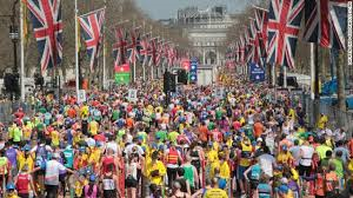 On Sunday about 35,000 people will line up to run the London Marathon. Along the route there will be 1,500 St John first aiders and 150 doctors, physiotherapists and podiatrists. The majority of runner's medical problems involve blisters and muscle cramps however what always makes a headline is if a runner dies or has a cardiac arrest during the marathon. Fortunately cardiac death during a marathon occurs very rarely (1 in 80,000 runners). Since 1981, when the London Marathon started, there have been eight cardiac deaths. Five of them were from coronary heart disease, two from hypertrophic cardiomyopathy and one from arrhythmogenic right ventricular cardiomyopathy. So far all the cardiac deaths have been in men. As the race day gets closer some runners seek advice as they are concerned about the risk of having a cardiac problem during the marathon. So how should a prospective marathon runner be assessed? I divide runners into two groups. In men aged more than 40 years the main cause of cardiac problems in an marathon is due to coronary artery disease. In women and younger men it is usually due to undiagnosed structural heart disease, usually hypertrophic cardiomyopathy. Assessment involves taking a detailed clinical history looking for symptoms of chest pain, shortness of breath, dizziness or blackouts associated with exercise. We document any cardiovascular risk factors and family history of sudden cardiac death or cardiac diseases. A cardiovascular examination is performed looking for murmurs, measurement of blood pressure and pulses. The cardiologist will usually do an electrocardiogram and often an echocardiogram to rule out structural heart disease In men over 40 or those with risk factors for ischaemic heart disease an exercise treadmill test is helpful to look for any evidence of coronary artery disease. Running a marathon is a gruelling event which places huge stresses on the heart and musculoskeletal systems but fortunately the risk of a cardiac problems is very low and the majority of patients will compete the marathon without problem.
1 Comment
Costas Tsakirides
13/4/2014 06:20:41 pm
Dr Bogle you talk a lot of sense - you captured the essence of this issue in a few lines. The only thing I would add is that there should be a systematic assessment of all those participating in competitive sport. Yes the cost is high but we would be reducing event rates even further.
Reply
Your comment will be posted after it is approved.
Leave a Reply. |
Dr Richard BogleThe opinions expressed in this blog are strictly those of the author and should not be construed as the opinion or policy of my employers nor recommendations for your care or anyone else's. Always seek professional guidance instead. Archives
August 2023
Categories
All
|
 RSS Feed
RSS Feed

